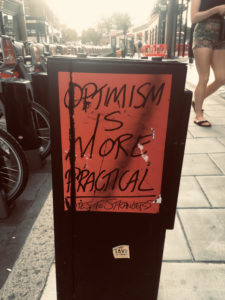Week Four: 19th to 24th of August
By Kaffe Keating
“Optimism is more practical.”
Poster in the street, Brixton
‘This isn’t going to work,’ I whinge.
‘Don’t worry about it, just keep going,’ come the supportive cries from the row of chairs behind me where the rest of the company looks on, helpless. Katherine, who plays Viola and Sebastian, is trying to get my attention but I wave her off. I need to solve this.
My coat is refusing to do what I want it to do. A far cry from what I imagined when I was whipping it around my head like a trainee magician in the TK Maxx down the road.
We’re running the whole show today and we’re almost at the end. It’s Saturday afternoon, the weather is beautiful outside (finally, it’s been raining non-stop for the last week and a half) and I’m in a sweltering rehearsal room trying to play three different characters all at the same time. Who are all having a conversation with each other. With nothing to differentiate them but a raincoat and some silly voices.
This is how Act V of the play opens, with a conversation featuring Fabian, Feste and Orisno; my three characters. It’s now being fondly referred to by the other company members as ‘The Kaffe Show.’ Currently, ‘The Kaffe Show’ is looking like it’s going to open to some luke-cold reviews and close soon after press night.
The first problem is that I just can’t get the changes quick enough. Feste wears the coat like a coat; arms through the sleeves. He’s currently having a conversation with Orsino, who wears the coat inside out over his left shoulder, like a Venetian cape. The lining on the inside is this really cool paisley – it looks good and it suits his character. Fabian, however, wears the coat like an apron (I’ve decided he’s a workman, the text gives you absolutely no clues about his character so you’ve got free rein there really) with the sleeves tied together behind my back.
As you might be able to imagine, switching from one of these to another, swiftly enough to avoid completely killing the pace of the scene, has its challenges.
‘Keep it simple,’ we were told, ‘Don’t overcomplicate things’. It was good advice, and I thought I’d followed it. I made the discovery early on that I needed to have the things that denoted all of my characters permanently on my person; otherwise I ran the risk of leaving bits of myself strewn across the stage. My characters talk to each other a lot, especially in the mad final act where all the loose ends are tied up.
The second problem is that my brain is now running on fumes. This week, everything has stepped up and the Designer/Stage Manager/Costume Supervisor roles have risen to join the already slightly taxing Actor/Director ones.
We still need to buy quite a few things, and also we need to sort a load of the music, and the fancy dress shop I was planning on going to won’t be open tomorrow, and I’m too hot, and I’m flopping around in a straightjacket of my own creation while trying to bleat out Shakespeare in an Irish accent.
I get through it. We get to the end of the run. And we’ve shaved about twenty minutes in total from our last attempt, a running time which will inevitably continue to diminish as the show gets tighter, and when we don’t have to spend ages watching me fighting with a coat.
I feel like I’m now in the part of the process which an old teacher of mine used to call ‘The Sainsbury’s Dip’. For any non-British readers, Sainsbury’s is a supermarket – so the ‘Walmart Dip’, if you will. It’s the phenomenon that occurs when you’re equidistant from the excitement and freshness of the first day of rehearsals and the nerves and adrenalin of the first performance. When you’re knackered and thinking: ‘maybe I should pack this all in and go and work in Sainsbury’s’. Now this is not to say that there’s anything wrong with working in Sainsbury’s of course, just that it would certainly be somewhere where you’d be able to go to work safe in the knowledge that you’re not going to throttle yourself with your own jacket.
But the point is that it’s a dip. It’s a low point, but from here things can only go up.
‘Week four is the hardest,’ I was told. Well we’ve done week four and we’ve basically got a show! There’s some stuff we need to buy, some mechanics we need to oil, some songs we need to figure out – but the shape is there.
Just as we were packing up for the weekend, Katherine came up to me with her own jacket in her hands. I don’t why she’s brought it with her today, it’s boiling outside. Then again, you can never be too careful with British weather.
‘Look.’ She has her arm in one of the sleeves, the side facing me, and her other arm is free. She then spins around to face the other direction, cleverly turning the coat inside-out as she does so, but keeping her arm in the sleeve. It’s Feste to Orsino, but the quick version. I hadn’t even thought of that as a possibility until now. This is what she was trying to show me earlier when I was too busy to listen.
It’s really easy to think that you’re completely responsible for your own problems; that just because they’re your problems, you need to be the one who solves them. ‘I got myself into this coat, and I need to get myself out of it.’ But actually, if you allow other people to help, people who can see the problem from the outside, you’re far more likely to find a solution.
I spotted this while we were walking to the pub for a well-earned pint in the sun after Saturday’s rehearsal. It’s a good thing to be reminded of every so often.

